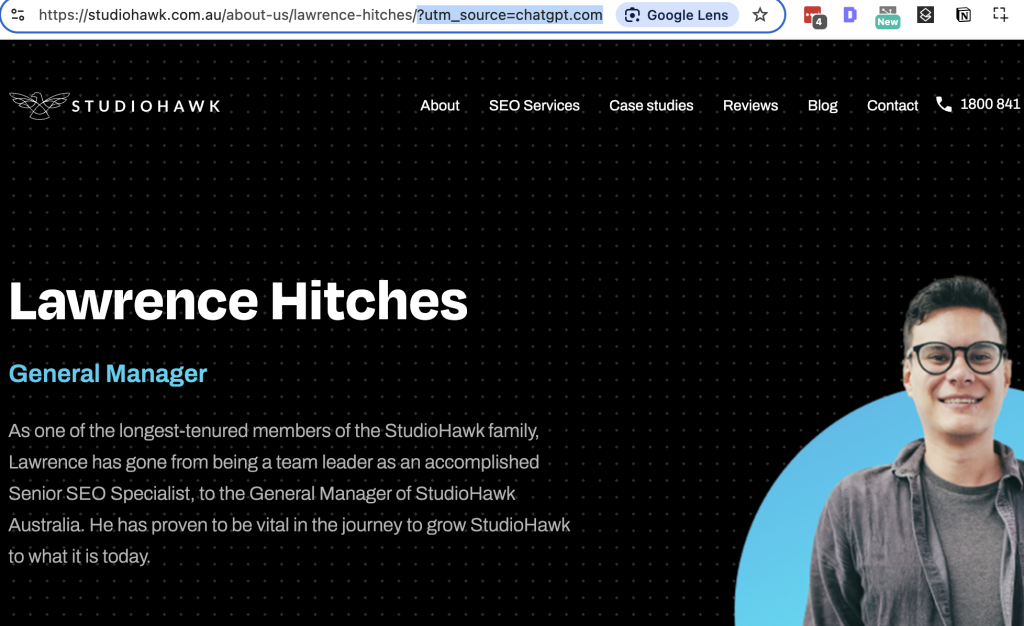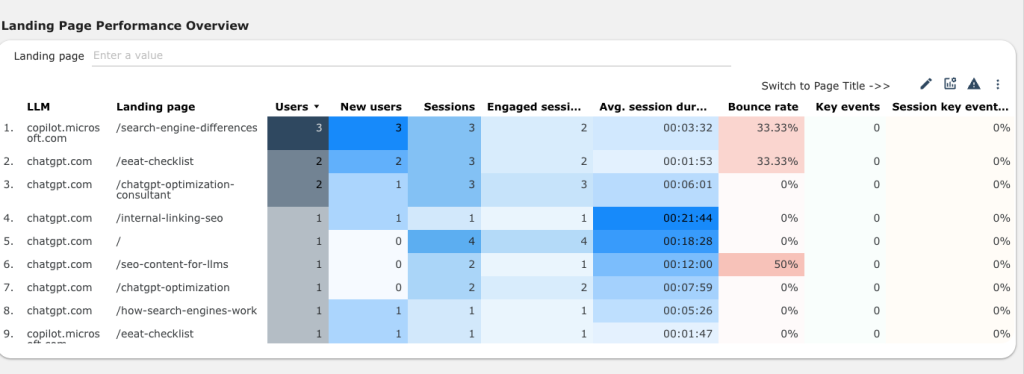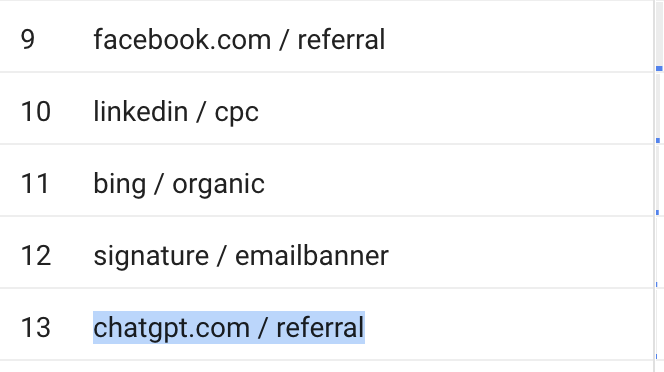What Is utm_source=chatgpt.com?
This is a UTM parameter — a tracking tag added to links to identify where a visitor came from.
When you see utm_source=chatgpt.com, it means someone clicked a link inside a ChatGPT result, and was referred to your website.
It’s currently being appended in two main places:
- ChatGPT with Browsing (Pro users using GPT-4 with browsing enabled)
- ChatGPT Search (previously called “Search with Bing”)
In both cases, if your site is referenced or cited in an AI-generated response and the user clicks it this tracking parameter gets attached to the URL, letting you know exactly how they found you.

Want a simpler way to track this traffic?
We built a free GA4 dashboard that shows your LLM referrals in one view, ChatGPT, Copilot, Perplexity, and more.

I’ll send the dashboard and setup guide straight to you.
Where You’ll See It
Not every link from ChatGPT will have this yet, but OpenAI has started rolling it out in a consistent way.
Look inside:
- Google Analytics 4 (GA4): Go to Traffic acquisition → Session source/medium and search for “chatgpt.com”.
- Matomo, Fathom, or other tools: Filter referral URLs or campaign parameters.
- Or use a URL filter to surface:
contains: utm_source=chatgpt.com
If you’re not seeing it yet, don’t panic, this is early days.
But if your content is showing up in ChatGPT’s answers (especially on trending or evergreen queries), it’s just a matter of time.

“Wait… ChatGPT Can Send Traffic?”
Yep. And that’s the shift most people are missing.
For years, AI-generated answers were closed systems. You’d ask a question, get a wall of text, and move on. No source links. No citations. No traffic.
That’s changed.
Today, ChatGPT (especially GPT-4-turbo with browsing) can:
- Browse the web in real-time
- Cite its sources with live, clickable links
- Recommend blog posts, tools, or businesses with UTM-tagged URLs
So if your content is clear, trustworthy, and well-structured, you can show up and you can get clicks.
It’s not just a theoretical SEO concept anymore. It’s happening.
Why This Tiny Parameter Matters
You might be thinking:
“Cool, but it’s not like this is sending me 10,000 visits a week.”
And you’d be right yet.
This isn’t about volume right now. It’s about visibility and future-proofing.
Here’s why it matters:
1. You’ll Know If You’re Being Cited
The moment you start seeing utm_source=chatgpt.com, it means your content is good enough to get pulled into an AI answer.
That’s a big deal.
It shows that:
- You’re in the LLM’s index (ChatGPT likely found you via Bing or its own crawling)
- Your formatting and structure were clear enough to extract
- You passed whatever trust signals it’s using
That’s valuable intel. Especially for SEOs and content marketers optimizing for AI overviews.
2. You’ll See What People Actually Click
AI isn’t just spitting out answers, it’s curating them.
If users choose your link from an answer panel, that tells you something important:
- Your headline or metadata was compelling
- Your page stood out from the others listed
- You’re answering the query better than competitors (or at least seeming like it)
It’s like ranking #1 on a micro-Serp inside ChatGPT. And it can guide your future content and copywriting strategy.
3. You’ll Understand How AI Agents Are Using Your Brand
ChatGPT, Perplexity, Gemini… they’re not just answering questions anymore.
They’re shaping user journeys.
From top-of-funnel discovery (e.g. “best tools for X”) to product research (e.g. “compare A vs B”), these LLMs are becoming guides, researchers, and recommendation engines rolled into one.
If your brand is being cited, compared, or used as a reference point inside these answers, you want to know.
It’s a glimpse into your AI brand presence. Not just your Google rankings.
So… What Should You Do With This?
Here’s a simple checklist:
1. Search Your Analytics
Head into GA4 or your analytics tool of choice. Search for:
utm_source=chatgpt.com
See if it’s popping up and if so, which pages are earning those clicks.
2. Run AI Queries in ChatGPT
Prompt GPT-4 (with browsing on) with some of your target questions.
Ask things like:
- “What’s the best [tool/service] for X?”
- “Top SEO agencies in Melbourne”
- “How to solve [problem your content addresses]”
Then, see who it cites. If it’s not you, why not?
What formats, titles, or structures are getting cited instead?
3. Start Tracking Over Time
Even if traffic is low now, this is your early signal.
Start benchmarking:
- Pages cited
- Queries appearing
- UTM-tagged traffic volume
Then look for opportunities to optimise further, using tactics like:
- Updating metadata to match query intent
- Using structured data and schema
- Answering common “refinements” and sub-questions directly in your content
Final Word: A New Referrer Has Entered the Chat
This isn’t the kind of news that’ll make front-page headlines.
But it is one of those quiet signals that tells you where the future is headed.
In 2025 and beyond, SEO won’t just be about Google.
It’ll be about how AI agents like ChatGPT cite, surface, and recommend your brand.
That makes utm_source=chatgpt.com the equivalent of seeing yourself in a new kind of search engine.
So… check your analytics.
Have you spotted it?
And if you have what did you find?

